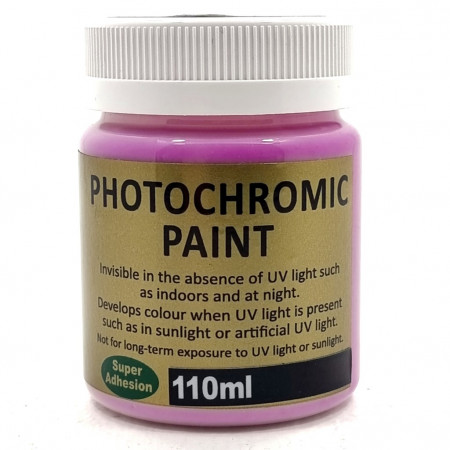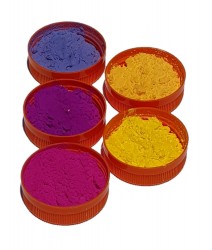Photochromic Paints
From
R 177.00
Availability:
- Photochromic paints are invisible in the absence of UV light (e.g. indoors) but develop a colour immediately when exposed to any UV light e.g. sunlight.
- Paint onto white surfaces.
- Super Adhesion: Can be applied to most surface types.
Photochromic Paints
We also sell Photochromic Pigment Powders. Click here to go to Photochromic Pigments.
How these Photochromic Paints work
These paints are basically invisible when no Ultraviolet (UV) light is present but develop a strong colour in the presence of any UV light.
Items painted with these paints show almost no colour when indoors but instantly develop their colour when a UV light is switched on. They also develop their colour as soon as they are taken outside during the day. The colour development outdoors even occurs in the shade and on cloudy days.
- Apply onto white coloured surfaces only.
- Not highly lightfast so long-term exposure to UV light will cause the colour effect to fade.
Watch this must see video. It takes less than 1 minute
Application ideas
You can paint something on an interior wall that nobody can see until a UV light is switched on. Great for a surprise effect and for gender-reveal parties.
You can create special effect invitations that can only be read with a UV light or outdoors.
You can come up with your own unique creative ideas e.g. art that changes colour or make a UV detector for a school project.
Super Adhesion Technology
Pure acrylic paints with Super Adhesion Technology. These paints can be applied directly to masonry, plastics, melamine, resins, wall tiles, non-corroding metals*, ridged rubbers, fabrics and interior wood. They should, however, be painted onto white surfaces so you may need to paint white first.
*Non corrosive metals include aluminium, galvanized steel, stainless steel copper, bronze and brass.
Surface Preparation
As with any normal paint, surfaces should be clean, grease free and must not have a flaking or powdery nature or damp problems from below the surface.
Lightly sand plastic and resin surfaces with a fine grit sandpaper prior to applying the paint.
If the surface is not white then paint it white first.
Paint over existing oil-based paints with a Universal Undercoat first. These tend to yellow so paint a normal white acrylic/PVA paint over the Universal Undercoat before painting with Photochromic Paint.
Keep out of reach of children
All our products should be kept out of reach of children under 5 years and anybody who may tend to place items or liquids in their mouths should be supervised. Even packing can become a choking hazard.
Unit Size |
|
| Unit Size |
110ml
350ml
|
Color |
|
| Colour |
Magenta
Orange
Yellow
Purple
Blue
|

















